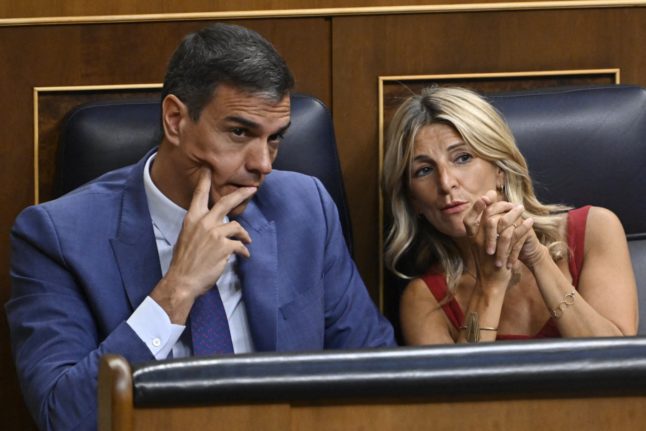The Digital Nomad Visa or DNV is often referred to as visado de teletrabajador de carácter internacional on most of the official websites in Spain and became available for the first time at the beginning of 2023.
There are a long list of requirements you need to meet in order to be eligible for the DNV, including having no more than 20 percent of your income come from Spain and having some type of social security agreement or paying it yourself.
One of the most challenging requirements, however, is the amount of income you need to earn.
The UGE (Unidad de Grandes Empresas y Colectivos Estratégicos), the body that deals with these visas and the one you apply to states that you need to prove you have monthly earnings of at least 200 percent of the minimum interprofessional salary (SMI), or minimum wage.
Currently in 2024, this means that you need to prove you have earnings of €2,646 per month or €31,752 per year.
READ ALSO: Is the income requirement for Spain’s digital nomad visa a gross or net figure?
If your partner or children are accompanying you to Spain, you will also need to prove you have extra money in order to support them.
If you’re applying for yourself and your partner, you will need to prove you earn an extra 75 percent of the minimum wage. This currently equates to an extra €1,984.50 per month on top of the €2,646 just for you, so a total of €4,630.50 per month.
For each additional family member after this, such as children, you will have to prove you have an extra 25 percent of the SMI, which is an extra €661.50 per month.
Many applicants don’t quite meet the threshold and often wonder if the authorities will accept savings in order to make up the shortfall.
This is asked time and time again in many social media groups associated with the DNV.
Can you provide savings for Spain’s digital nomad visa application if earnings aren’t enough?
As with many bureaucratic processes in Spain, the answer is not completely straightforward.
Several members of the Spanish Digital Nomad Visa Facebook group have said that they have successfully been granted the DNV by providing evidence of savings in bank accounts, while many others say that they’ve been rejected because they haven’t earned enough and savings were not able to be taken into account.
One member of the group wrote: “It is an income based visa and therefore savings will only be taken into account if there is a small gap between the requirement and the income. But even then, it is still up to UGE to decide whether they want to accept it or not”.
Another member confirmed this by saying that her lawyer told her that if she has a small shortfall in income, the extra can be made up of savings over £20k.
Someone else added: “I applied without the minimum income requirement covered. I complemented it with savings and got approved”.
READ ALSO: Spain clarifies which digital nomads will get lower tax rates
But others have been told something completely different and been told by their lawyers that savings can’t be used to apply for the DNV at all.
With so many different answers it can be tricky to figure out the truth.
The best option is to contact the UGE itself and find out, which is what we did.
“The requirement is to prove that the income which will be obtained as remuneration meets the minimum requirements,” the UGE told The Local Spain regarding the €2,646 a month threshold.
“However, if the difference is not much (there is no specific amount but rather it depends on the overall analysis of the application), savings that cover the difference for at least the first two years of the (DNV) authorisation can be assessed”.
Therefore, we can conclude that DNV applicants with monthly earnings that are slightly below the digital nomad visa requirement may be able to successfully provide savings to cover the shortfall, but in the end Spanish authorities decide on a case-by-case basis.
One DNV applicant told other digital nomads on a Facebook forum that the UGE replied to them with: “Any means of evidence admitted by law may be used and an individualised analysis will be carried out”.
Again, it’s likely this will depend on the amount of shortfall you have. We don’t know exactly what the threshold is, so it’s really speculation.
Perhaps if you only need a couple of hundred euros more to meet the income requirement, you may be able to make it up with savings, but if it’s a large amount, it’s likely you’ll get denied.
There’s no one-fits-all answer unfortunately. It’s of course more risky to apply if you don’t meet the income requirement, but if you really can’t make it work, your best bet is to try to submit evidence of your savings along with your application to see if you’ll be accepted.
They may ask for extra evidence later on down the line or you may be successful first time. Of course, there’s every possibility you’ll be rejected too.
READ ALSO: What digital nomads in Spain wish they’d known before applying



 Please whitelist us to continue reading.
Please whitelist us to continue reading.
Member comments